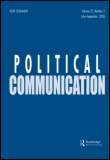
POLITICAL COMMUNICATION
Scope & Guideline
Pioneering Research in Political Communication and Sociology
Introduction
Aims and Scopes
- Media Influence on Political Behavior:
Explores how different media formats, including traditional news and social media, shape political attitudes, behaviors, and public engagement. - Political Discourse and Framing:
Analyzes the framing of political issues and events by media outlets and the implications this has for public perception and political polarization. - Role of Technology in Political Communication:
Investigates the impact of emerging technologies, such as social media platforms and algorithms, on political communication and information dissemination. - Elections and Campaign Strategies:
Focuses on the dynamics of political campaigning, including the effects of advertising, media coverage, and voter behavior in electoral contexts. - Identity Politics and Representation:
Examines how race, ethnicity, gender, and other identity factors influence political communication and the representation of diverse groups in media. - Misinformation and Disinformation:
Addresses the challenges posed by misinformation in political contexts, including the mechanisms of its spread and public responses to false information.
Trending and Emerging
- Impact of Social Media on Politics:
There is an increasing focus on how social media platforms influence political engagement, mobilization, and the spread of misinformation, especially in the context of recent elections and crises. - Racial and Ethnic Dynamics in Political Communication:
Research examining the intersection of race and political communication is gaining traction, exploring how racial identities influence political discourse and media representation. - Health Communication in Political Contexts:
The COVID-19 pandemic has spurred research on health communication, particularly how political narratives shape public understanding and response to health crises. - Populism and Political Polarization:
There is a growing interest in studying populist movements and their communications strategies, as well as the broader effects of polarization on democratic discourse. - Algorithmic Governance and Media Influence:
Emerging studies are increasingly addressing the role of algorithms in shaping news content and public opinion, examining how platform governance impacts political communication.
Declining or Waning
- Traditional Media Studies:
Research focusing solely on traditional media, such as newspapers and broadcast television, has decreased as studies increasingly embrace the complexities of digital and social media environments. - Geopolitical Communication:
While still relevant, the focus on international relations and geopolitical communication has waned in favor of more localized and immediate political issues, particularly those influenced by social media. - Public Opinion Polling:
The reliance on public opinion polling as a standalone measure of political sentiment has decreased, with researchers favoring more nuanced methods that consider social media dynamics and real-time engagement. - Historical Political Analysis:
There appears to be a diminishing emphasis on historical analyses of political communication, as current events and their immediate impacts take precedence over retrospective studies. - Political Satire and Humor:
Though once a vibrant area of study, research on political satire and humor has declined, possibly overshadowed by more pressing issues surrounding misinformation and serious political discourse.
Similar Journals
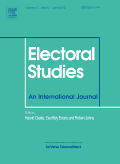
ELECTORAL STUDIES
Fostering Critical Debates in DemocracyELECTORAL STUDIES, published by ELSEVIER SCI LTD, is a leading international journal dedicated to the study of electoral processes, political behavior, and their implications across the globe. With a strong commitment to advancing the field of Political Science and International Relations, the journal boasts an impressive impact factor and ranks within the Q1 category in its field for 2023, indicating its high-quality contributions and significant scholarly influence. As a respected avenue for rigorous research since its inception in 1982, ELECTORAL STUDIES continues to provide a platform for innovative analyses and critical debates surrounding electoral politics, voter behavior, and democratic practices. Researchers, professionals, and students alike will find invaluable insights and comprehensive articles that address contemporary electoral issues, underscoring the journal's critical role in shaping the discourse of political science.
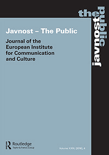
JAVNOST-THE PUBLIC
Empowering Voices through Rigorous ScholarshipJAVNOST - THE PUBLIC is a prestigious academic journal that has established itself as a leading platform within the field of communication. Published by Routledge Journals, Taylor & Francis Ltd in the United Kingdom, this journal caters to researchers, professionals, and students interested in the multifaceted dynamics of public communication and societal engagement. With an impressive Q1 ranking in the Communication category as of 2023 and a Scopus ranking of #166/511, placing it in the 67th percentile, it is widely recognized for its rigorous research contributions and theoretical insights. The journal has been in continuous circulation since its inception in 1994, and it actively seeks to publish high-quality, empirical studies that explore the nuances of public discourse, media influence, and societal interactions. Though a traditional publication, JAVNOST - THE PUBLIC remains committed to advancing the field by offering valuable resources and knowledge crucial for addressing contemporary challenges in public communication.
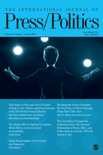
International Journal of Press-Politics
Unraveling the Dynamics of Press and Political PowerThe International Journal of Press-Politics, published by SAGE Publications Inc, stands as a premier scholarly platform at the intersection of communication, sociology, and political science. With a distinguished history dating back to its inception in 2003 and maintaining its relevance through 2024, this journal is recognized in the academic community for its rigorous exploration of the dynamics between the media and political processes. The journal proudly holds a Q1 ranking in both Communication and Sociology and Political Science categories, placing it in the top tier of its field, underscored by its impressive Scopus rankings, which reflect its global influence and reach. With an intention to foster innovative research and discourse, IJPP is committed to being accessible, contributing significantly to the understanding of how press and politics shape societal narratives, thus serving as an essential resource for researchers, professionals, and students alike. Explore this esteemed journal to engage with cutting-edge studies that drive the field forward.
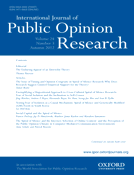
INTERNATIONAL JOURNAL OF PUBLIC OPINION RESEARCH
Shaping Policies Through Scholarly InsightsINTERNATIONAL JOURNAL OF PUBLIC OPINION RESEARCH, published by OXFORD UNIVERSITY PRESS, stands as a premier platform for scholarly discourse in the fields of sociology and political science. With an ISSN of 0954-2892 and an E-ISSN of 1471-6909, this esteemed journal holds a prestigious Q1 rating in its category for 2023, ranking #378 out of 1466 within Scopus’ social sciences metrics, reflecting a 74th percentile performance. Since its inception in 1989, the journal has converged an expansive array of research focused on public opinion dynamics, making it an essential resource for researchers, professionals, and students alike. Although it does not currently offer open access options, the journal provides invaluable insights into the nuances of public sentiment and civic engagement, addressing contemporary challenges and trends affecting societal governance. Its influential contributions help shape policies and inform scholarly debate, solidifying its role as a crucial asset in advancing knowledge within its fields.

Jurnal Komunikasi-Malaysian Journal of Communication
Navigating the Evolving Landscape of CommunicationJurnal Komunikasi-Malaysian Journal of Communication is a premier, peer-reviewed journal published by the NATIONAL UNIVERSITY OF MALAYSIA, FACULTY OF SOCIAL SCIENCES & HUMANITIES. With an ISSN of 2289-151X and an E-ISSN of 2289-1528, this journal focuses on diverse aspects of communication theory and practice, particularly within the Malaysian context. As a significant contributor to the field, it has established itself with a respectable impact factor and currently holds a Q3 ranking in the Communication category per the 2023 Scopus Quartiles. The journal is dedicated to fostering scholarly discourse and advancing knowledge in communication studies, encompassing an array of topics from interpersonal communication to mass media impact. Since its inception, it has been committed to maintaining high academic standards while providing an engaging platform for researchers, professionals, and students. With converged years from 2014 to 2024, Jurnal Komunikasi continues to address emerging trends and challenges in communication, making it an invaluable resource for those seeking to deepen their understanding and engagement with the discipline.
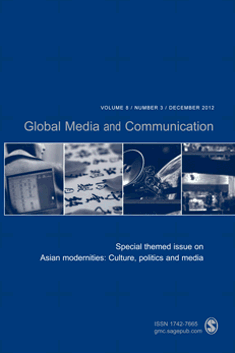
Global Media and Communication
Exploring the Nexus of Media and Communication WorldwideGlobal Media and Communication is a premier journal dedicated to advancing the fields of media and communication studies, published by SAGE Publications Ltd. With an ISSN of 1742-7665 and an E-ISSN of 1742-7673, this journal offers a platform for scholarly discourse and innovative research that explores the intricate relationships between global media practices and communication strategies. Recognized as a Q1 journal in both the Arts and Humanities (Miscellaneous) and Communication categories for 2023, it stands out in its commitment to delivering high-quality, peer-reviewed articles that contribute to the understanding of contemporary media landscapes. Located in London, United Kingdom, the journal benefits from being at the heart of cultural and digital innovation. Researchers, professionals, and students can look forward to insightful articles that not only critique existing frameworks but also propose new methodologies, ensuring that Global Media and Communication remains a vital resource for anyone interested in navigating the evolving dynamics of media and communication on a global scale.

Cuadernos Info
Unlocking Insights in Communication and Information Sciences.Cuadernos Info is a distinguished open access journal published by Pontificia Universidad Católica de Chile, Facultad de Comunicaciones. Since its inception in 1984, this journal has served as a critical platform for the dissemination of innovative research in the fields of Communication and Library and Information Sciences. With a commendable impact factor and categorized within the Q2 quartile for both disciplines, Cuadernos Info positions itself as an influential resource, ranking #110 out of 280 in Library and Information Sciences and #214 out of 511 in Communication within Scopus, demonstrating its relevance and authority in scholarly discourse. By embracing a robust Open Access model, the journal ensures that research is accessible, facilitating knowledge sharing among academics, practitioners, and students worldwide. With its commitment to excellence and a strong focus on current trends, Cuadernos Info continues to be an essential resource for those seeking to explore the complexities of communication and information practices in contemporary society.
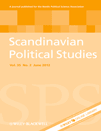
SCANDINAVIAN POLITICAL STUDIES
Pioneering Research in Nordic Political SystemsSCANDINAVIAN POLITICAL STUDIES is a premier academic journal published by WILEY that has been a cornerstone of political research since its inception in 1967. Focusing on the complex dynamics of Scandinavian political systems, this journal provides a vital platform for scholars and practitioners alike to disseminate innovative research and critical analyses in the fields of sociology and political science. With an impressive Q1 ranking in both categories for 2023 and a robust Scopus ranking, it positions itself as a leading source of insight into regional politics. While currently not open access, the journal remains committed to enhancing scholarly dialogue and advancing knowledge, making it an essential resource for researchers, students, and professionals interested in the Scandinavian political landscape.

EUROPEAN JOURNAL OF POLITICAL RESEARCH
Exploring the Dynamics of Political ThoughtEUROPEAN JOURNAL OF POLITICAL RESEARCH, published by Wiley, stands as a leading platform for scholarly discourse within the realms of sociology and political science. This esteemed journal, identified by its ISSN 0304-4130 and E-ISSN 1475-6765, has maintained a rigorous academic standard since its inception in 1973 and continues to publish until 2024. Ranked in the top 2% of its field, it is categorized as Q1 in both Sociology and Political Science, reflecting its position at the forefront of impactful research. With a prestigious Scopus rank of #32 out of 1,466 journals, the EUROPEAN JOURNAL OF POLITICAL RESEARCH is essential for researchers, professionals, and students looking to deepen their understanding of contemporary political phenomena and sociological theories. Although the journal does not currently offer open access, its contributions are vital for anyone engaged in serious academic exploration of political research, providing readers with insights that shape practices and policies across Europe and beyond.
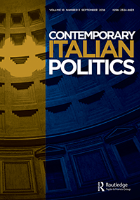
Contemporary Italian Politics
Showcasing High-Impact Research in Political ScienceContemporary Italian Politics, published by Taylor & Francis Ltd, is an essential forum for scholars and practitioners engaged in the vibrant discourse surrounding Italian political dynamics and their broader implications in the international arena. With an ISSN of 2324-8823 and E-ISSN 2324-8831, this journal has established itself as a leading publication within the field, boasting a Q1 ranking in both Political Science and International Relations as well as Sociology and Political Science as of 2023. The journal, which has been producing insightful research since its inception in 2013, is indexed within Scopus with a notable ranking of #83 out of 706 in Political Science, reflecting its high impact and relevance—evident through a percentile ranking in the 88th. The objectives of the journal include the exploration of contemporary political issues, analysis of policies, and examination of sociological factors influencing Italian governance, thereby making it indispensable for researchers, professionals, and students dedicated to understanding Italy's political landscape. Located in the United States, at 2-4 Park Square, Milton Park, Abingdon OX14 4RN, Oxon, England, this journal encourages submissions that advance scholarly discussions and underline the importance of Italian politics in global contexts.